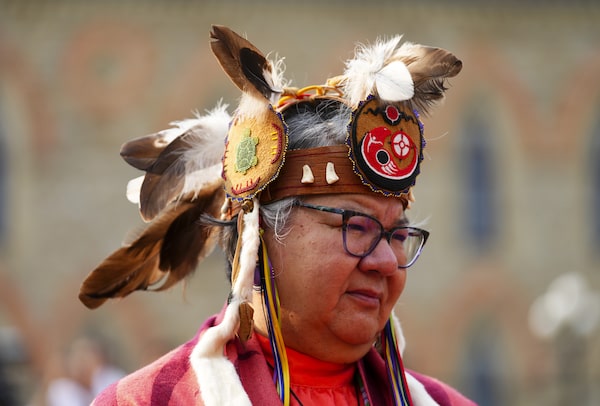
AFN National Chief RoseAnne Archibald attends a commemorative ceremony on Parliament Hill in Ottawa on June 21.Sean Kilpatrick/The Canadian Press
RoseAnne Archibald, the ousted national chief of the Assembly of First Nations, faces long odds against reinstatement, as the organization readies itself for its annual convention next week.
After the AFN executive committee and its administration removed Ms. Archibald on June 28, she released a video statement calling on the assembly’s chiefs to restore her to her post.
Russell Diabo, a policy analyst from the Mohawk Nation of the Kahnawake, who was working as an adviser to Ms. Archibald until her removal, said her only hope now is for an emergency resolution to be added to the agenda of next week’s general assembly in Halifax. But even he considers this a longshot.
He said the resolution process is largely co-ordinated by AFN staff members and the regional chiefs that make up the organization’s executive committee, and that it would need the support of two-thirds of the executive to make a late entry to the resolution floor.
“It would take broad support for a reinstatement resolution, starting with chiefs raising the matter in regional caucuses, especially big caucuses like Ontario and B.C.,” Mr. Diabo said.
He called Ms. Archibald’s ouster unfairly orchestrated. “Politically, it was a virtual lynching, in my opinion,” he said.
Ms. Archibald was removed after a vote during a special assembly of chiefs last week. More than two-thirds of the 231 chiefs who voted supported her ouster.
The vote followed a human-resources investigation into complaints from AFN staff members of bullying and harassment by Ms. Archibald. The investigation report has not been released publicly, but the resolution to remove Ms. Archibald says the probe found that she had harassed two complainants, breached confidentiality and whistle-blower requirements, and violated the AFN’s code of conduct.
Ms. Archibald said in her five-minute video statement, posted Monday night, that her removal was a “great injustice against her, all women and grassroots peoples.”
“They just went ahead and did one of the most violent acts against an Indigenous First Nation woman leader ever, in a national kind of way, in a world stage kind of way. And that is not acceptable. We need to find the healing path forward.”
Ms. Archibald has been a divisive figure since she was first elected two years ago to lead the AFN, the main national advocacy body for First Nations. Those who voted for her removal said her leadership had gridlocked the organization.
Ms. Archibald has said her troubles with the organization are a result of the fact that she has pressed the AFN to address what she has called its “financial improprieties.”
She was suspended last year by the AFN’s executive of regional chiefs, but was reinstated at a general AFN meeting last July. The chiefs then agreed to an independent, third-party forensic audit of the past 10 years of the AFN’s financial activity, in particular payouts and contracts. Ms. Archibald is named in two defamation lawsuits from three individuals named in contracts awarded in 2020 and 2021.
Nipissing First Nation Chief Scott McLeod characterized the past two years of AFN governance as “managing chaos.” He said chiefs have understandably decided to move on from the tumult of the Archibald era.
“Despite its shortcomings, the AFN does some good advocacy and co-ordination, but it hasn’t been running properly for a while now,” he said. “A lot of chiefs have become frustrated and want to hit the reset button and wish her well.”
At last year’s annual general assembly in Vancouver, dozens of resolutions went unaddressed – including those focused on climate change, land claims and the 231 calls for justice of the National Inquiry into Missing and Murdered Indigenous Women and Girls – as leaders spent much of the event dealing with issues related to Ms. Archibald’s leadership, Mr. McLeod said.
With the next general assembly set for July 11, he said, chiefs want to avoid a repeat of last year.
“We’re headed towards another assembly that could be another drama show, and the question is, how do we get any real work done?” he said.
The Taykwa Tagamou Nation, Ms. Archibald’s home nation in Northern Ontario, released a statement Tuesday affirming its support for her.
In the statement, Taykwa Tagamou Chief Bruce Archibald questioned the fate of the forensic audit the chiefs agreed to last summer.
“Who is going to take charge of the forensic audit now and give the chiefs the answers we have been demanding?” he said.
Derek Archibald, the nation’s deputy chief, said in the statement that the Taykwa Tagamou have “well-founded concerns” about the financial management and legal practices of the AFN.
The statement said Ms. Archibald was removed from office based on a summary report of the human-resources investigation, and not the full report.
“It’s obvious RoseAnne is the scapegoat for this corruption,” Bruce Archibald said. “Chiefs have still not been privy to the full investigation report, despite many requests and all identifying information being redacted.”
According to Joe Alphonse, a prominent First Nations leader in British Columbia, the future of the AFN is in the balance.
“At this point, I’m throwing in the towel and saying we don’t want to be part of the AFN,” said Mr. Alphonse, who is chief of the Tl’etinqox First Nation and tribal chairman of the Tŝilhqot’in National Government, located in B.C.’s Central Interior.
“Until a lot of healing takes place there, the Tŝilhqot’in don’t want to be part of anything like that,” he said. “That misery ship they’re running, we don’t want it to dock here.”